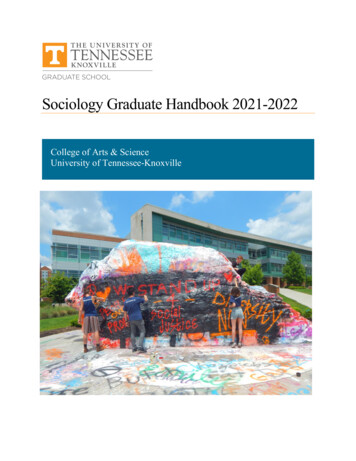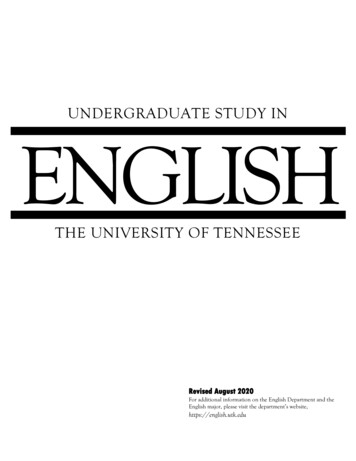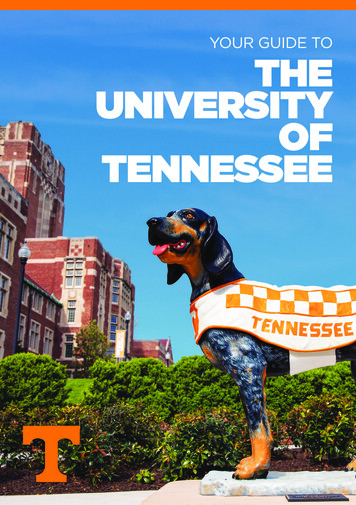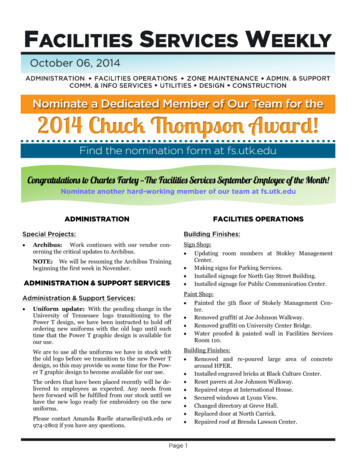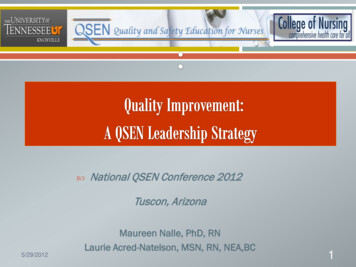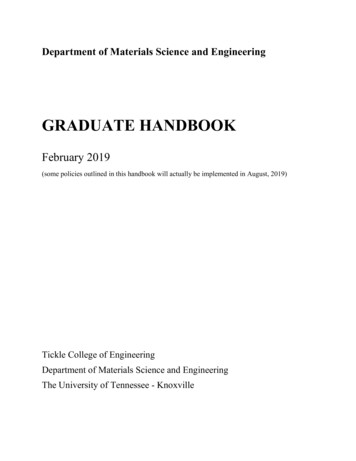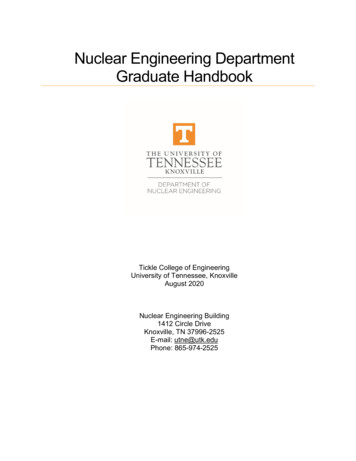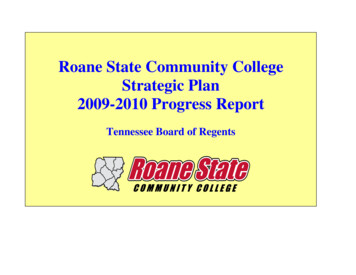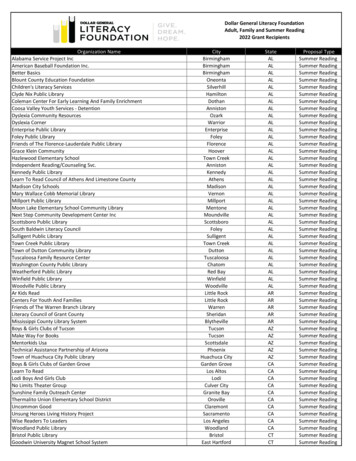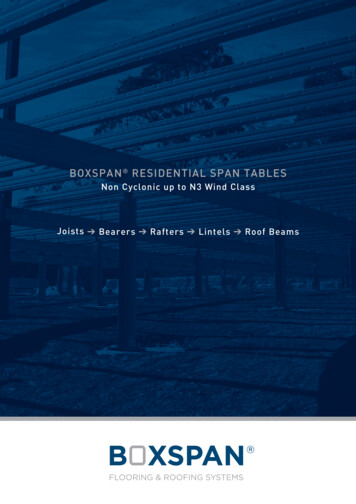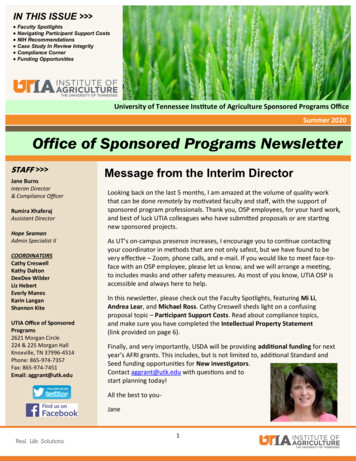
Transcription
IN THIS ISSUE Faculty Spotlights Navigating Participant Support Costs NIH Recommendations Case Study In Review Integrity Compliance Corner Funding OpportunitiesUniversity of Tennessee Institute of Agriculture Sponsored Programs OfficeSummer 2020STAFFJane BurnsInterim Director& Compliance OfficerRumira XhaferajAssistant DirectorHope SeamanAdmin Specialist IICOORDINATORSCathy CreswellKathy DaltonDeeDee WilderLiz HebertEverly ManesKarin LanganShannon KiteUTIA Office of SponsoredPrograms2621 Morgan Circle224 & 225 Morgan HallKnoxville, TN 37996-4514Phone: 865-974-7357Fax: 865-974-7451Email: aggrant@utk.eduMessage from the Interim DirectorLooking back on the last 5 months, I am amazed at the volume of quality workthat can be done remotely by motivated faculty and staff, with the support ofsponsored program professionals. Thank you, OSP employees, for your hard work,and best of luck UTIA colleagues who have submitted proposals or are startingnew sponsored projects.As UT’s on-campus presence increases, I encourage you to continue contactingyour coordinator in methods that are not only safest, but we have found to bevery effective – Zoom, phone calls, and e-mail. If you would like to meet face-toface with an OSP employee, please let us know, and we will arrange a meeting,to includes masks and other safety measures. As most of you know, UTIA OSP isaccessible and always here to help.In this newsletter, please check out the Faculty Spotlights, featuring Mi Li,Andrea Lear, and Michael Ross. Cathy Creswell sheds light on a confusingproposal topic – Participant Support Costs. Read about compliance topics,and make sure you have completed the Intellectual Property Statement(link provided on page 6).Finally, and very importantly, USDA will be providing additional funding for nextyear’s AFRI grants. This includes, but is not limited to, additional Standard andSeed funding opportunities for New investigators.Contact aggrant@utk.edu with questions and tostart planning today!All the best to youJane1
Faculty Spotlights Dr. Mi Li is a Assistant Professor at the Center for Renewable Carbon and theDepartment of Forestry, Wildlife & Fisheries. Dr. Li earned his doctorate inWood Science from Auburn University in 2014 and his B.S. and M.S. inChemical Engineering of Forestry Bioproducts and Biomaterials from Northeast ForestryUniversity in China. He has been worked in biomass & pretreatment chemistry, biomass &biproducts characterization, lignin chemistry & biomass modification & functionalization inthe past. Dr. Li has contributed to more than 60 peer reviewed journal publications. He isthe recipient of Distinguished Achievement Award 2017 at Oak Ridge National Laboratoryand his research has been highlighted at the US DOE Office of Sciences webpage in 2017.His current research programs include TCPB sponsored catalytic conversion of corn intovaluable chemicals, 4D printing of biomass-based intelligent materials, bio-derivedup-cyclable polymers and plastics, and environment-friendly fractionation using greenchemistry. Dr. Li is the father of two— 7-years-old Mia and 4-years-old Skyler and he lovesbiking, tubing, and fishing with his family.Dr. Andrea Sketch Lear is an Assistant Professor in the Department of Large Animal ClinicalSciences. Her areas of expertise include large animal internal medicine, infectious disease,virology, immunology, reproductive physiology, & neonatology. Dr. Lear’s professionalinterests include participation in farm animal veterinary practice, advancement of animalagriculture, leadership in organized veterinary medicine and training of future veterinarians& animal scientists. She earned her Ph.D. here at the University of Tennessee. She alsoreceived her B.S. at Murray State University, M.S. at Colorado State University, DVM atAuburn University & Diplomate at American College of Veterinary Internal Medicine. In thefuture, we look forward to seeing Dr. Lear’s work in assessment of fetal viability, in-uterodiagnostics, maternal-fetal communication & epigenetics of neonatal immunology. Dr. Learand her family live on a farmstead which raises meat and dairy goats, chickens, along withvegetable gardens. In her personal time she enjoys playing in the beautiful rivers ofTennessee with her husband and dogs.Take a moment to stop & smell the flowers! The UT Gardens in Knoxville, Crossville and Jackson are open 7 daysa week from sunrise to sunset.22
Faculty Spotlights Michael Ross joined UT about a year ago as an Assistant Professor in the Departmentof Plant Sciences, Sustainable Landscape Design concentration in the Herbert Collegeof Agriculture in intercollegiate partnership with the School of LandscapeArchitecture in the College of Architecture and Design. His areas of expertise includelandscape architecture, sustainability, resilience & design; culture building; mentoring &recruitment; and restoration ecology & invasive species mitigation. Ross’ professionalinterests include landscape architecture, ecological design, green infrastructure,sustainability metrics, urban design, restoration ecology, management and biodiversity& design. He received his B.S. at the University of Texas at El Paso & earned his MLA atTexas Tech University. In the future, Professor Ross would like to focus his work infloating wetlands & pollution mitigation; professional attitudes toward sustainabilitymetrics; repurposing post-industrial & infrastructural landscapes as biodiversitycorridors; service learning and outreach, recruitment & retention. Ross explains thatteaching during Covid has been a challenge as we tend to work closely with students in design studio and the impact onthat studio culture has required adjustments. That being said, the freedom to extend mentoring and advisingopportunities to zoom has meant that while the spring semester never felt like it had a solid ending I have had verymeaningful interactions with students throughout the summer. I have also been able to have informal interactions withgraduate Masters of Landscape Architecture students and undergraduate Plant Sciences students, creating peermentoring opportunities. It comes down to taking a constraint and finding an opportunity. In his free time Ross enjoysbonsai, hiking, music, reading, film, tying flies and fishing.Dr. Dave Anderson—Associate Dean for Research and Graduate StudiesDr. Anderson has effectively led the department of Large Animal Clinical Sciences and has advanced basic, translational,and clinically-relevant scientific research within the Institute of Agriculture, UTK, and the Graduate School of Medicine.He is excited about the opportunity to lead the research and graduate studies program and to assist all faculty, staff,and students in their efforts to advance biomedical science knowledge.Dr. Stephen Kania—Professor and Assistant Dean of Research and Graduate StudiesDr. Kania has played an important role as director of the graduate degree programs. He has brought expertise andstability to the program, has been greatly respected by graduate degree seeking students and their mentoring faculty,and has served as an effective leader on the UTIA and UTK campuses.Dr. Scott Stewart—Director of the West Tennessee AgResearch and Education CenterAn entomologist well known to row crop producers throughout the South, Dr. Stewart has been named by UTAgResearch as the next, and seventh, director of the West Tennessee AgResearch and Education Center in Jackson.Stewart succeeds Bob Hayes, who retires as director on September 30, concluding a distinguished forty-two-year careerwith UTIA.23
Navigating Participant Support Costs By: Cathy CreswellParticipant support costs (PSC) is funding provided to enable and encourage people to attendconferences or training programs without undo financial burden. A participant is a non-UTemployee who is the recipient (not a provider) of a workshop, conference, seminar or othershort-term instructional activity. They may be a student, scholar, scientist, teacher, or a privatesector representative.It pays for items such as stipends, subsistence, travel allowances, and registration fees paid to oron behalf of participants or trainees. Who is not a participant? A UT employee or intern, advisoryboard members, or anyone who has a deliverable or is providing a service to the project is notconsidered a participant.PSC are budgeted in a separate category in the federal application budget, and must be accounted for separately by theUniversity, because these costs are excluded when calculating F&A costs. Therefore, a separate R account is required forPSC.Funds provided for PSC that are not spent cannot be re-budgeted for use in other categories unless prior writtenapproval has been obtained from the sponsor. Additionally, allowances may not be paid to trainees who are receivingcompensation from other Federal government sources while participating in the project.PSC are typically incurred for projects that include an education or outreach component. These types of costs are mostcommonly included in National Science Foundation (NSF) grants, such as the Research Experience for Undergraduates(REU) or Research Experiences for Teachers (RET) program. Federal agencies vary in their requirements for managingPSC, and PSC need to be part of the funding opportunity or agency rules.PSC are defined by the Uniform Guidance in 2 CFR 200.75. The Uniform Guidance requires prior approval by thesponsor to incur participant support costs under federally sponsored awards, and must be incurred within the periodof performance of the project.Office of Sponsored Programs New Website We will have a new face to our Website coming soon. Great bigthanks to Mark Young for all his hard work!Don’t forget to visit the UTIA Office of Sponsored Programs websitefor forms and information such as: MTA questionnaires Indirect Cost Rate AgreementsUniform Guidance Tools Standard Contracts and AgreementsCompliance Resources and Documents Timeline to Meet 3-Business –Day DeadlineLINK: http://utiasponsoredprograms.tennessee.edu/34
NIH Recommendations on the Vertebrate Animal Section What is the VAS? The VAS is the portion of the grant application in which the investigator ensures the animal activityis appropriate for the proposed research & adheres to standards of humane care & use of laboratory animals.The following guidance is provided to assist applicants and offerors in preparing the Vertebrate Animals Section(VAS) for submission to the NIH, and to assist reviewers in evaluating the VAS of applications and proposals.If live vertebrate animals are to be used, applicants must address the following criteria:1. Description of Procedures (Vertebrate Animals Section)Provide a concise description of the proposed procedures to be used that involve live vertebrate animals. Identifythe species, strains, ages, sex, and total number of animals by species to be used. If dogs or cats are proposed,provide the source of the animals.2. Justifications (Vertebrate Animals Section)Provide justification that the species are appropriate for the proposed research. Explain why the research goalscannot be accomplished using an alternative model (e.g., computational, human, invertebrate, in vitro).3. Minimization of Pain and Distress (Vertebrate Animals Section)Describe the interventions to minimize discomfort, distress, pain, and injury. These include analgesia, anesthesia,sedation, palliative care, and humane endpoints.4. Method of Euthanasia (Cover Page Supplement / PHS Fellowship Supplemental Form)Provide a justification for methods of euthanasia that are not consistent with the American Veterinary MedicalAssociation (AVMA) Guidelines for the Euthanasia of Animals. If answer is “No” to the question “Is methodconsistent with AVMA guidelines?”, describe the method and provide scientific justification in the text fieldprovided.Please see NIH’s new online training module on the Vertebrate Animals Section (VAS) in grant applications.Here you will find an overview of the requirements, a checklist for applicants & reviewers , detailed instructions, &responsibilities of applicants, reviewers & NIH staff. [see: f]NIH—Turning Discovery in HealthAlso, please consider applying to the Early Career Reviewer(ECR) Program. Here you will find more details, includingqualifications for becoming an AReviewer/ECRCSR website: https://public.csr.nih.gov/45
Case Study in Review IntegrityCase Study in Review Integrity: Embellished Credentials in a Grant ApplicationHave you ever been tempted to embellish your credentials in a grant application? What about fabricatingcredentials? Would this be a case of research misconduct or a violation of review integrity? These can be costlyerrors, as shown by the case described below (inspired by a true story; we’ve changed details and fictionalizednames).An NIH program official received a formal letter from the Chancellor of a prestigious health sciences center.Specifically, the letter stated that the university found that Dr. Edison, a Department Chair, had made thefollowing false claims in his Curriculum Vitae for his job application and his bio sketch in NIH grant applications: authorship of numerous publications,membership in a prestigious scientific professional society, andhaving earned the Ph.D. degree from a prestigious foreign institution.The NIH program official notified an NIH Research Integrity Officer, who in turn contacted the DHHS Office ofResearch Integrity (ORI). ORI also knew about the allegations but was unable to pursue them because falsifiedcredentials are not defined as research misconduct. As per 42 C.F.R. Part 93.103, research misconduct meansfabrication, falsification, or plagiarism in proposing, performing, or reviewing research, or in reporting researchresults. However, ORI found evidence of 30 fake publications – publications that did not exist – in Dr. Edison’sresume.But the story doesn’t end here. News media reported that Dr. Edison had resigned his position at the universityfor a position at another. And shortly thereafter, Dr. Edison left the second university after news reporters alertedthat university to his background.Recent studies suggest that “embellishing” credentials in job applications is widespread, and we have reason tobelieve this extends to biosketches in NIH grant applications as well. Although ORI may not pursue allegations offalsified credentials as possible research misconduct, the NIH may pursue such allegations in NIH grantapplications as possible, deliberate attempts to violate peer review integrity.If the NIH determines that credentials in an NIH grant application are false, the NIH may take any number ofactions, including removing the scientist from NIH peer review service, contacting the scientist’s institution,withdrawing the scientist’s NIH grant applications or discontinuing his/her funding, and/or referring the matter tothe NIH Office of Management Assessment for possible referral to the Office of the Inspector General forconsideration for suspension and debarment.In the end, Dr. Edison’s grants were discontinued, totaling over 400,000 a year, and his applications werewithdrawn. Dr. Edison’s current whereabouts are unknown.Want to read other peer review case studies in the series? Check all of them out here.Dr. Michael Lauer is NIH's Deputy Director for Extramural Research,serving as the principal scientific leader and advisor to the NIH Director on the NIH extramuralresearch program. Check out his article “Open Mike” at NIH Extramural n-a-grant-application/56
The University of Tennessee encourages international collaborations, but it is important for our investigators to betransparent about their foreign relationships and activities. The University of Tennessee’s Office of Research hascompiled the following information to provide guidance and resources to assist University of Tennessee researchers inmeeting their compliance obligations to federal sponsors. International Sponsored Program ActivitiesThrough the end of September, Cornerstone on Demand has provided access to a newly developed learning module inK@TE titled: Recognizing and Mitigating Unconscious 26September302020.pdfUSDA Non-Discrimination Policy StatementIntellectual Property AgreementChanges in federal regulations require the University of Tennessee to have written agreements with all employees whowork on federally funded projects. The intent of the change is to make sure employees disclose and assign ownership toinventions made using federal funding.In order to comply with this new legal requirement, the university is requiring that all current faculty, staff, and studentemployees review and electronically sign an agreement to the Statement of Policy on Patents, Copyrights, and OtherIntellectual Property, UT Board Policy BT0024, by August 31.Anyone involved in a Sponsored Programs project should sign this system policy. If you have notcompleted the Intellectual Property Agreement, please take a minute to do so at this link:Review & Sign the Policy Here67
UPCOMING FUNDING OPPORTUNITIESPlan now to take advantage of USDA NIFA opportunities in FY 2021!AFRI Foundational Science RFA for Upcoming Years has been Released!RFA FY 2021 and 2022 AFRI Deadlines FY 2021 and 2022Also, if you meet eligibility criteria for New Investigators, take advantage of these opportunities now offered:New Investigator Standard Grant and New Investigator Seed GrantNotify aggrant@utk.edu NOW with your plans to apply!!!Watch your e-mail for UTIA Office of Sponsored Programs weekly funding opportunities digest! The UTK Faculty Development Team has also launched a weekly funding digest featuring information from theNIH Digest, round-ups from the Corporate and Private Foundations Office, limited submissions, and internalopportunities. Sign up to receive the digest here. Use Pivot to search and save funding opportunities, set up funding alerts, or manage your scholar profile usingyour UT NetID. Use the Foundation Directory Online to search a database of the 10,000 largest private, community,and corporate foundations in the U.S. UTK’s Office of Research and Engagement’s Management of Limited Submission Funding Opportunities has alistserv (link) that you can subscribe to. USDA NIFA: https://nifa.usda.gov/page/search-grant NIH: http://grants.nih.gov/grants/funding/funding program.htm Non-NIH Opportunities for Predoctoral & Graduate Researchers: link Postdoctoral Non-NIH Opportunities: octoral.aspx NSF: http://www.nsf.gov/funding/index.jsp Grants.gov: http://www.grants.gov/ Tennessee State Government Rural Task Force: s--resources.html Rural Assistance Center: Various TN Funding Opportunities at http://www.raconline.org/states/tennessee/funding Philanthropy News Digest (Foundation Center): http://philanthropynewsdigest.org/ Morris Animal Foundation: http://www.morrisanimalfoundation.org/researchers/ Grant Resources in Science, Math, and Integrated STEM: -andcolleges/UTIA Office of Sponsored Programs Facebook & Twitter pages are avenues we use to keep you up to date with theever changing events in Research Administration.An additional source of information is our web page. (link)You may submit questions, ideas or suggestions for improvements of ournewsletter to aggrant@utk.edu.78
Programs 2621 Morgan ircle 224 & 225 Morgan Hall Knoxville, TN 37996-4514 Phone: 865-974-7357 Fax: 865-974-7451 Email: aggrant@utk.edu University of Tennessee Institute of Agriculture Sponsored Programs Office Summer 2020 . graduate Masters of Landscape Architecture students and undergraduate Plant Sciences students, creating peer .
